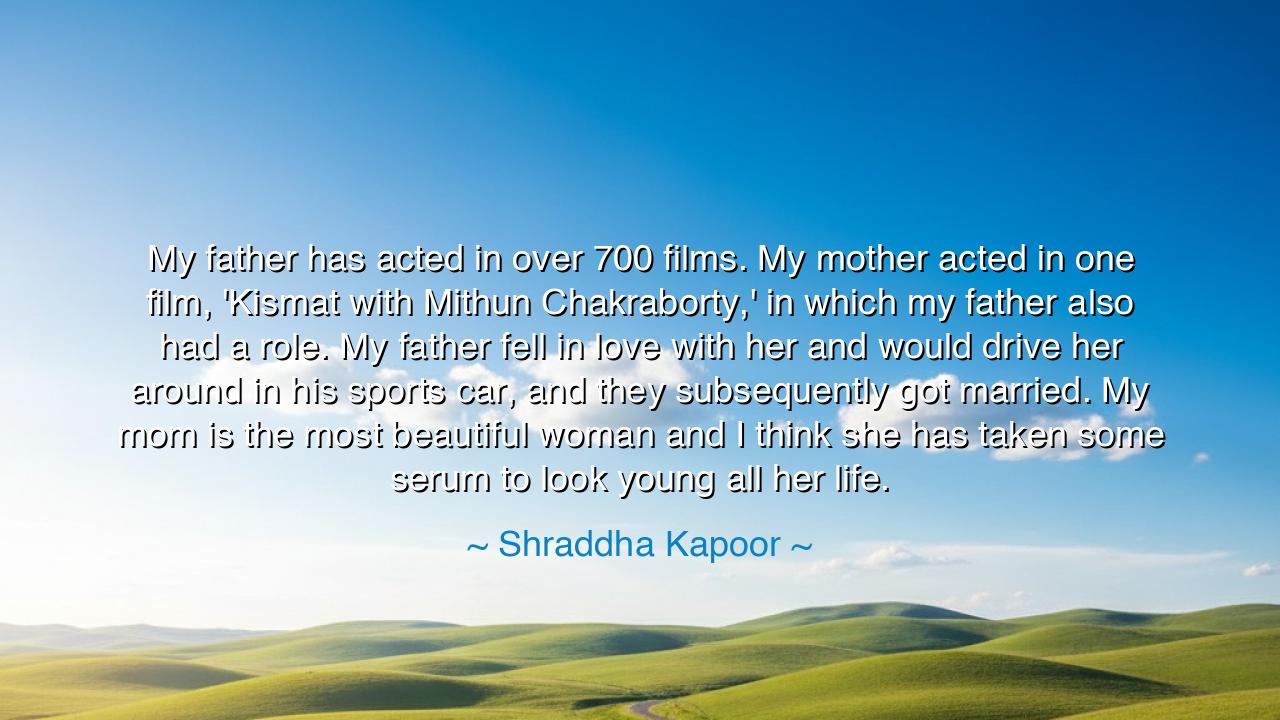
My father has acted in over 700 films. My mother acted in one
My father has acted in over 700 films. My mother acted in one film, 'Kismat with Mithun Chakraborty,' in which my father also had a role. My father fell in love with her and would drive her around in his sports car, and they subsequently got married. My mom is the most beautiful woman and I think she has taken some serum to look young all her life.






In the voice of Shraddha Kapoor, there is not merely nostalgia, but reverence for the mysterious way in which love and destiny intertwine to shape the lives of families. When she says, “My father has acted in over 700 films. My mother acted in one film, 'Kismat with Mithun Chakraborty,' in which my father also had a role. My father fell in love with her and would drive her around in his sports car, and they subsequently got married. My mom is the most beautiful woman and I think she has taken some serum to look young all her life,” she offers us more than a charming story of romance; she reveals a lineage woven of art, devotion, and timeless affection. Beneath the glamour of cinema lies an eternal tale—the meeting of two souls, bound not by fame but by fate.
This story begins, as many destinies do, in the theater of chance. Her father, a man of immense labor and longevity—over 700 films, a lifetime lived under the lights—embodied the perseverance of one who gives his existence to the craft. Her mother, in contrast, stepped onto the screen only once, in a film aptly titled Kismat, meaning “fate.” And what fate it was! In that single appearance, she did not merely act a part; she met the man who would love her for life. The title of the film itself becomes a prophecy fulfilled—proof that the invisible hands of destiny write our greatest scripts long before we can read them.
Shraddha’s words remind us of an ancient truth: great love often enters quietly, without grand design. It may arrive while we chase another dream, appearing not as a reward but as a revelation. In her father’s admiration for her mother, there lies the purity of a love that transcends career and status. The image of him “driving her around in his sports car” is not vanity—it is youth in its most human form, that tender joy of wanting to share every moment, every road, every song. It is the poetry of affection written not with ink, but with motion.
Through her gentle humor—“I think she has taken some serum to look young all her life”—Shraddha unveils the eternal admiration of a daughter for her mother. There is laughter here, but behind it a deep truth: love can preserve beauty in ways that no elixir ever could. When one is cherished, time itself becomes softer. The glow of affection outlasts the fading of years. Her mother’s youthfulness, whether real or imagined, becomes a symbol of what devotion and grace can do to the human spirit.
This story finds its echo across history. Consider Napoleon’s devotion to Josephine, who, though older and marked by life’s trials, remained the center of his adoration. He once wrote, “You to whom nature has given spirit, grace, and beauty, you who alone can move and rule my heart.” Love, when sincere, makes the beloved seem untouched by time. Just as Shraddha sees her mother as eternally radiant, so have the great hearts of history seen beauty not as an age, but as a light of the soul.
In another sense, her reflection honors the family as the first theater of inspiration. From her father’s relentless artistry, Shraddha inherited the fire of creation; from her mother’s grace, she learned humility and inner beauty. The marriage of those two forces—work and warmth, discipline and tenderness—is what allows true greatness to bloom. Every child who looks back upon such a union sees not just parents, but pillars of identity, the roots of who they have become.
Thus, the lesson of this quote is not limited to fame or film—it is universal. Love is the alchemy that turns ordinary encounters into eternal stories. It is the hidden current beneath our ambitions, reminding us that success without tenderness is hollow, and that beauty without affection is fleeting. The Kapoors’ story teaches us to treasure the people who shape our paths, to recognize that behind every achievement lies a lineage of love and sacrifice.
And so, let all who listen remember: life is not only about the roles we play before the world, but about the hearts we touch behind the curtain. The film of destiny may have many scenes, but its most beautiful moments are unscripted. Cherish them, honor them, and speak of them—as Shraddha Kapoor has—with gratitude, humor, and awe for the quiet power of love that keeps us young forever.






AAdministratorAdministrator
Welcome, honored guests. Please leave a comment, we will respond soon